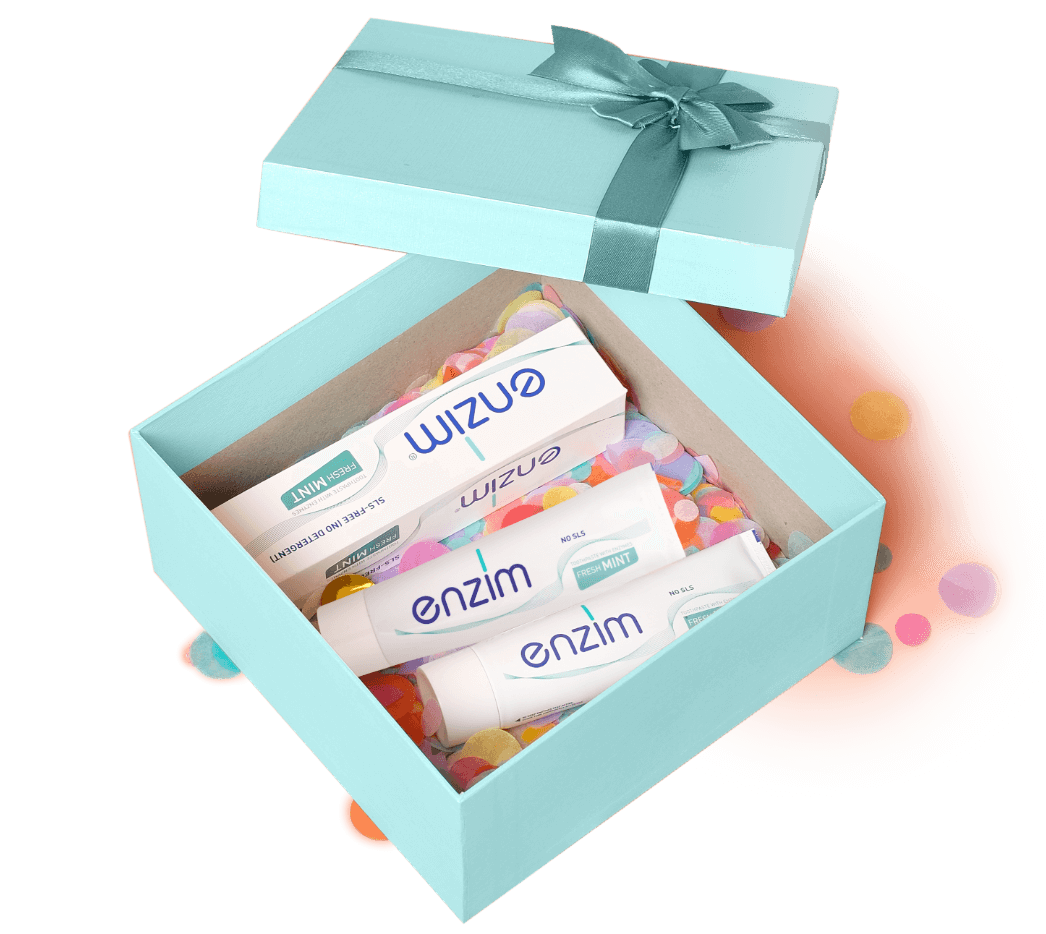Not Just for Cold Drinks: 7 Myths About Toothpaste for Sensitive Teeth

Not Just for Cold Drinks: 7 Myths About Toothpaste for Sensitive Teeth - Enzim Singapore
When you think about tooth sensitivity, the image that probably comes to mind is someone wincing after sipping an iced drink or biting into ice cream. It's a common reaction—but sensitivity is more complex than just discomfort from cold. And the toothpaste that treats it? Often misunderstood. Understanding toothache causes is crucial for effective treatment, especially when eating and drinking becomes a painful experience.
Toothpaste for sensitive teeth is a category full of misconceptions. Some think it's only for people with severe tooth pain or teeth pain. Others assume it's less effective than regular toothpaste or that it can't be used long term. Let's clear up the confusion. In this article, we'll debunk 7 common myths about sensitive teeth toothpaste and help you make better choices for your oral hygiene.
Myth 1: Toothpaste for Sensitive Teeth Is Only for Cold Sensitivity
While cold triggers are common, tooth sensitivity can be caused by:
-
Hot drinks
-
Sweet or acidic foods
-
Brushing teeth or flossing
-
Pressure from chewing
Sensitive teeth toothpaste helps reduce discomfort caused by a wide range of triggers—not just cold. If you experience sharp pain when eating sweets, teeth pain when biting, or teeth pain when drinking cold water, this type of toothpaste may still be a great fit for your sensitive teeth treatment. Additionally, dental sealants can provide an extra layer of protection against sensitivity triggers.
Myth 2: You Only Need It When You Have Pain
Tooth sensitivity often develops gradually. Early signs can include:
-
Mild discomfort while brushing teeth
-
Tingling from certain foods
-
Occasional zaps of pain with temperature changes
By the time you feel real toothache or wonder "Why does my teeth hurt when I chew?", your tooth enamel or gum health may already be compromised. Using toothpaste for sensitive teeth as a preventive measure can stop the problem before it worsens and serve as an effective sensitive teeth remedy. If you find yourself thinking, "My tooth hurts when I put pressure on it," it's time to consider a desensitizing toothpaste. In some cases, a worn filling might be the culprit, requiring attention from a dentist.
Myth 3: It Numbs the Pain but Doesn't Fix Anything
Many sensitive teeth toothpastes work by blocking the tubules in dentine that lead to nerve endings, addressing dentin hypersensitivity. Some also use potassium nitrate to calm the nerve response. But enzyme-based formulas go a step further—they support the mouth's natural defenses, reduce bacteria, soothe sensitive gums, and prevent tooth enamel wear. In other words, it's not just about numbing tooth pain—it's about healing and providing a long-term sensitive teeth cure. For more severe cases, dental bonding or even root canal therapy might be necessary to address the underlying issue.
Myth 4: It's Not as Good at Cleaning Teeth
Some people believe toothpaste for sensitive teeth is less effective at fighting plaque buildup or freshening breath. In reality, it depends on the formula. High-quality options (especially enzyme-based ones) can clean just as thoroughly, if not better, without relying on harsh foaming agents or abrasives that harm sensitive areas and exposed dentin. Many desensitizing toothpastes also contain fluoride for added protection. Using a soft-bristled toothbrush alongside these toothpastes can further protect sensitive teeth while maintaining good oral hygiene. Some formulations even include dental adhesives to help protect exposed root surfaces.
Myth 5: It Takes Forever to Work
Some people expect instant results after the first use when looking for how to stop sensitive teeth pain immediately. While some relief can happen quickly, lasting improvement usually comes with consistent use. After a few days, you may notice less sting from hot drinks or brushing. After 2–3 weeks, many people report significant improvements in their tooth sensitivity.
Tip: For faster results, try applying a small amount directly on sensitive spots after brushing and leave it on like a protective barrier. This technique is particularly effective for areas with worn enamel or exposed roots.
Myth 6: It's Only for Older People
Tooth sensitivity can affect anyone at any age. Younger people who:
-
Use teeth whitening products
-
Eat high-acid diets (think soda, citrus, vinegar)
-
Have gum recession from braces or brushing too hard
...are just as likely to need toothpaste for sensitive teeth. Don't wait until your 40s to protect your tooth enamel and nerve endings. If you're wondering "Why are my teeth sensitive all of a sudden?" or "Why do my teeth hurt when I chew?", it might be time to consider a sensitive teeth treatment. Additionally, tooth grinding, which can lead to sensitivity, is common in young adults. Using a mouthguard at night can help prevent this issue. In some cases, temporomandibular disorder (TMJ) can cause tooth pain and sensitivity, requiring specialized treatment.
Myth 7: You Can't Use It Long Term
Some assume that once the teeth pain is gone, they should switch back to a regular toothpaste. But if you stop using the toothpaste that was helping, symptoms may return. High-quality toothpaste for sensitive teeth is safe for long-term use. Enzyme-based options, in particular, support whole-mouth health without causing dryness, ulcers, or irritation over time. These toothpastes can effectively manage hot and cold sensitivity and help protect exposed roots, which are common causes of ongoing sensitivity. For severe cases of gum recession, a gum graft procedure might be recommended alongside long-term use of sensitive toothpaste.
The Bottom Line
Sensitive teeth aren't just about reacting to ice water or wondering "Why does my tooth hurt when I put pressure on it?" And toothpaste for sensitive teeth isn't just a temporary fix. It can be part of a long-term strategy to keep your tooth enamel, exposed dentin, and gums healthy—especially if it uses enzyme-based technology.
Understanding what causes sensitive teeth is crucial. Whether it's due to enamel wear, gum disease, cavities, cracked teeth, or other factors, addressing the root cause alongside using the right toothpaste is key. Remember, sensitive teeth treatment goes beyond just managing symptoms—it's about maintaining overall oral health.
Next time you reach for a toothpaste, ask yourself: Is it doing more than just numbing the pain? Is it supporting your oral environment, soothing your tissues, and preventing future discomfort? Consider how it might complement other dental procedures you may need for optimal oral health, such as dental sealants, dental bonding, or even root canal therapy in severe cases.
If it is, then it's not just toothpaste for sensitive teeth. It's smarter toothpaste for comprehensive oral care, designed to make eating and drinking a pleasure again, not a pain.
best toothpaste for sensitive teeth best teeth whitening for sensitive teeth sensitive front teeth sensitive in my teeth



